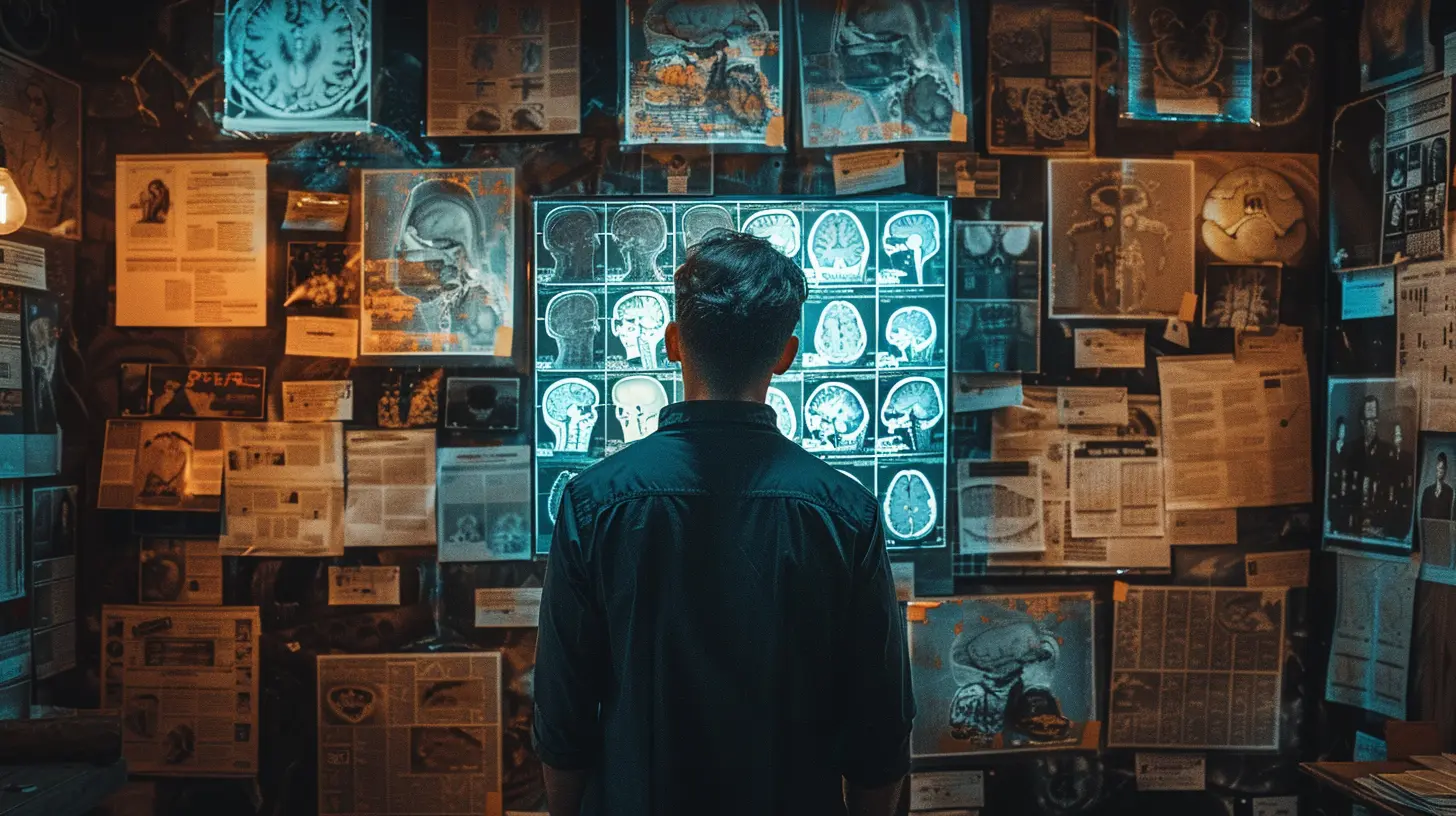The Science of Memory: How Forensic Psychologists Evaluate Recovered Memories in Legal Cases
22 December 2024
Memory is a fascinating and complex process, right? Our entire life—our experiences, emotions, relationships—revolves around memories. But here's the thing: memory isn’t always as reliable as we’d like to think. This becomes especially crucial in legal cases, where recovered memories can play a major role in deciding someone's fate.
So, how do forensic psychologists evaluate these memories? How can they tell if a recollection is accurate or if it's been distorted over time? In this article, we’ll dive deep into the science of memory and explore how forensic psychologists work with recovered memories in legal cases. Buckle up—it's going to be an enlightening ride!

What Exactly Is a Recovered Memory?
First things first—what do we mean by "recovered memory"? Simply put, a recovered memory is a recollection of a past event that was forgotten for a period of time. In many cases, these memories are brought back to the surface during therapy or through certain cues in the environment.The tricky part? These memories often involve highly emotional or traumatic events, like abuse or violence, which can make them even more complex to evaluate. Some people might go years without recalling a traumatic event, only for it to resurface after a certain trigger. But not all recovered memories are accurate—sometimes, they can be distorted, incomplete, or even entirely false.
This is where forensic psychologists step in.

The Role of Forensic Psychologists in Legal Cases
Forensic psychologists are like detectives of the mind. They specialize in understanding human behavior in the context of the law. When it comes to recovered memories, their job is to assess the reliability of the memory and determine whether it can be used as evidence in a legal case.Sounds straightforward, right? Not so fast. Memory is a slippery slope. It’s not like a video recording that you can just replay at will. Instead, it’s more like a puzzle where some pieces might be missing or warped. Forensic psychologists use a combination of tools and techniques to assess how valid and reliable a recovered memory is before it can be presented in court.

How Does Memory Work? Breaking Down the Science
Before we go any further, let’s break down how memory works. Understanding the science behind memory formation and retrieval is crucial for evaluating recovered memories.Three Stages of Memory
Memory, in general, is broken down into three stages:1. Encoding: This is when you first take in information. Think of it like uploading a file to your brain. For instance, if you’re witnessing a crime, you’re encoding details like the suspect’s appearance, the setting, and the sequence of events.
2. Storage: Once the information is encoded, it’s stored in your brain. But unlike a computer, your brain doesn’t just store things in neat little folders. Different aspects of the memory (like sounds, smells, and emotions) are stored in various parts of the brain.
3. Retrieval: This is where things get interesting. Retrieval is the process of recalling stored information. This can happen spontaneously (like when a specific smell reminds you of your grandmother’s kitchen) or deliberately (like when you’re trying to remember where you parked your car).
Why is Memory so Unreliable?
Here’s the kicker: memory isn’t perfect. It’s influenced by a ton of factors—stress, emotions, the passage of time, and even external influences like leading questions. In fact, every time you "retrieve" a memory, you're actually reconstructing it. This means that the more you recall a particular memory, the more it can change, kind of like a game of telephone.This phenomenon is especially relevant when it comes to recovered memories. If someone is trying to recall a traumatic event from years ago, there’s a higher risk that the memory could be distorted or incomplete.

Recovered Memories and Legal Cases: The Challenges
So, why is it so important to evaluate recovered memories carefully in legal cases? Well, think about it—people’s lives hang in the balance. A recovered memory could be the key piece of evidence in a criminal trial, but what if that memory isn’t accurate?False Memories: A Major Concern
One of the biggest challenges forensic psychologists face is distinguishing between real memories and false memories. False memories are recollections of events that never actually happened, but the person believes they did. These can be unintentionally created through suggestive questioning or faulty recollection.For instance, if a therapist unintentionally leads a client to believe they were abused as a child, the client might develop a false memory of the abuse, even though it never happened. Scary, right? This is often referred to as "memory implantation."
The Role of Suggestion in Memory Formation
Suggestion plays a huge role in shaping our memories. Studies have shown that people can be influenced to "remember" things that never occurred simply by being exposed to suggestive information. This is why forensic psychologists have to be extremely careful when interviewing witnesses or victims, especially when dealing with recovered memories.They avoid leading questions like, "Do you remember being hurt by your uncle?" Instead, they ask open-ended questions that allow the person to recall the memory in their own words, without external influence.
The Legal Implications
The stakes are high when recovered memories are involved in legal cases. On one hand, a recovered memory could provide critical evidence that leads to justice for a victim. But on the other hand, a false memory could send an innocent person to prison.This is why judges and lawyers often rely on expert testimony from forensic psychologists. These professionals can help the court understand the complexities of memory and offer insights into whether a particular recollection is trustworthy.
How Forensic Psychologists Evaluate Recovered Memories
Now that we’ve covered the basics of memory and its pitfalls, let’s get into the nitty-gritty: how do forensic psychologists actually evaluate recovered memories?1. Assessing the Context of the Memory
One of the first steps is to assess the context in which the memory was recovered. Was it recalled during therapy? Did it resurface spontaneously? The context gives important clues about the memory’s reliability.For example, if the memory was recovered through hypnosis or suggestive therapy practices, there’s a higher likelihood that it could be influenced by external factors. On the other hand, if the memory resurfaced without any external prompts, it might be more reliable.
2. Looking for Corroborating Evidence
Forensic psychologists also look for corroborating evidence to support the recovered memory. This could include physical evidence, witness testimony, or other forms of documentation that back up the person’s recollection.The goal is to determine whether the memory aligns with objective facts. If there’s no supporting evidence, the memory might be less trustworthy.
3. Evaluating the Emotional Content
Another important factor is the emotional content of the memory. Traumatic memories are often emotionally charged, but that doesn’t necessarily mean they're accurate. In fact, strong emotions can sometimes distort memories.Forensic psychologists carefully evaluate the emotional aspects of the memory, paying attention to whether the emotions seem appropriate for the event being recalled. If the emotions don’t match the situation, that could be a red flag.
4. Using Psychological Tests
In some cases, forensic psychologists might use psychological tests to assess memory accuracy. These tests can help determine whether the person has a history of suggestibility or is prone to creating false memories.5. Considering the Passage of Time
Finally, the passage of time is a critical factor in evaluating recovered memories. Memories naturally degrade over time, and the longer the gap between the event and the recovery of the memory, the more likely it is that the recollection could be distorted or incomplete.
The Ethics of Using Recovered Memories in Court
We can’t talk about recovered memories in legal cases without addressing the ethical issues involved. Should recovered memories be allowed as evidence in court? What if they’re false?There’s no easy answer. On one hand, it’s important for victims to have the opportunity to pursue justice, even if their memories were repressed for years. On the other hand, the risk of false memories can’t be ignored.
Forensic psychologists play a critical role in navigating these ethical dilemmas. Their job is to provide an objective analysis of the memory, ensuring that the legal system strikes a balance between seeking justice and protecting the rights of the accused.
Final Thoughts: Memory is a Double-Edged Sword
Memory is a powerful tool, but it’s also fragile. When it comes to legal cases, recovered memories can be a double-edged sword—they can either lead to justice or to wrongful conviction.Forensic psychologists are on the front lines of this battle, using their expertise to evaluate the accuracy and reliability of recovered memories. It’s a delicate process, but one that plays a crucial role in ensuring that the legal system remains fair and just.
As we continue to learn more about how memory works, we can only hope that our understanding of it will help us distinguish between fact and fiction—because, ultimately, the truth is what we’re all after.
all images in this post were generated using AI tools
Category:
Forensic PsychologyAuthor:

Christine Carter
Discussion
rate this article
15 comments
Soliel Cruz
Exploring the intricate dance between memory and truth, this article sheds light on how recovered memories can shape legal outcomes. A reminder that our minds are both a vault of experiences and a potential minefield of misremembered details.
February 4, 2025 at 4:33 PM

Christine Carter
Thank you for your insightful comment! It's crucial to understand how memory can influence justice, and I'm glad the article resonated with you.
Arwenia Carrillo
This article sheds fascinating light on the complexities of memory and its implications in legal contexts. I’m intrigued by how forensic psychologists navigate the often murky waters of recovered memories. It raises important questions about the reliability of memory and its role in justice. Looking forward to more insights!
January 31, 2025 at 3:42 PM

Christine Carter
Thank you for your insightful comments! I'm glad you found the article engaging. The complexities of memory are indeed critical in the legal field, and I appreciate your interest in this important topic.
Tenley McGuffey
Recovering memories in court sounds like trying to find your car keys—sometimes you just end up with a wild guess and a whole lot of 'I swear I parked here!'
January 26, 2025 at 4:35 PM

Christine Carter
That's a great analogy! Memory retrieval can indeed be unpredictable, highlighting the importance of careful evaluation in legal contexts.
Ava Flores
Oh great, just what we needed—a deep dive into the art of remembering things we might’ve dreamed up! Can’t wait for the courtroom drama starring my imagination!
January 18, 2025 at 5:28 AM

Christine Carter
Thank you for your feedback! The complexities of memory, especially in legal contexts, are indeed fascinating and sometimes contentious. I'm glad to spark your imagination!
Tempest Thornton
This article highlights the delicate balance between memory's fragility and its pivotal role in justice. Understanding the complexities of recovered memories is essential for forensic psychologists, as it fosters a more nuanced approach to evaluating testimonies and ensuring fair legal outcomes.
January 15, 2025 at 5:27 AM

Christine Carter
Thank you for your insightful comment! Memory's complexity is indeed crucial for equitable justice, and I'm glad the article sheds light on this important issue.
Carly Campbell
This article highlights the delicate interplay between memory and trauma in forensic psychology, reminding us that while recovered memories can be powerful, their reliability hinges on context, suggestibility, and the complexities of human cognition.
January 13, 2025 at 5:34 AM

Christine Carter
Thank you for your insightful comment! Indeed, understanding the nuances of memory and trauma is crucial in forensic psychology, and context plays a pivotal role in assessing the reliability of recovered memories.
Zephyris Gilbert
Understanding memory is crucial in justice. Forensic psychologists illuminate the complexities of recovered memories, bridging science and law to ensure truth prevails in every case!
January 10, 2025 at 3:44 PM

Christine Carter
Thank you for highlighting the vital role of understanding memory in the justice system! Forensic psychologists play a key part in navigating the complexities of recovered memories, ensuring that the truth is upheld in legal proceedings.
Sylas McNeely
This article provides essential insights into the complexities of recovered memories in legal contexts. Understanding the science behind memory evaluation is crucial for both forensic psychologists and the justice system.
January 7, 2025 at 3:35 AM

Christine Carter
Thank you for your feedback! I'm glad you found the article valuable in highlighting the importance of understanding memory in legal contexts.
Elowyn Cook
Memory: like WiFi—sometimes strong, sometimes just buffering!
January 2, 2025 at 5:09 AM

Christine Carter
That's a clever analogy! Memory can indeed vary in clarity and reliability, much like our WiFi connections. Thank you for sharing!
Vincent McFadden
Memory is both a powerful ally and a potential deceiver in legal contexts. Understanding its complexities helps forensic psychologists navigate the delicate balance between truth and distortion in recovered memories.
December 26, 2024 at 5:35 AM

Christine Carter
Thank you for your insight! Indeed, the dual nature of memory is crucial in our field, emphasizing the need for careful evaluation in legal contexts.
Sage Snyder
Unraveling the shadows of the mind, forensic psychologists navigate the labyrinth of recovered memories—where truth and deception dance in haunting silence.
December 24, 2024 at 5:00 PM

Christine Carter
Thank you for your insightful comment! Indeed, the intricate interplay of memory, truth, and deception is crucial in understanding how forensic psychologists assess recovered memories in legal contexts.
Maisie Carter
“Memory is a fragile tapestry, woven with threads of reality and imagination. What happens when the past is reconstructed? Truth or illusion?”
December 24, 2024 at 4:35 AM

Christine Carter
Memory's reconstruction blurs the line between truth and illusion, highlighting the complexities forensic psychologists face in evaluating recovered memories in legal contexts.
Dolores Sullivan
This article effectively highlights the complexities of memory retrieval in forensic psychology. It sheds light on the nuances of recovered memories, emphasizing the importance of understanding their malleability and the implications for legal proceedings. A critical examination of memory reliability is essential for justice.
December 23, 2024 at 5:31 AM

Christine Carter
Thank you for your insightful comment! I'm glad you found the article's exploration of memory retrieval complexities and its implications for justice valuable.
Reagan Hines
Great insights! Very relevant to justice.
December 22, 2024 at 3:30 PM

Christine Carter
Thank you! I'm glad you found it relevant to justice.
Marlowe Wilkerson
This article highlights the complexities of memory retrieval in forensic psychology, emphasizing the importance of evaluating the reliability of recovered memories in legal contexts to prevent miscarriages of justice.
December 22, 2024 at 3:17 AM

Christine Carter
Thank you for your insightful comment! Evaluating the reliability of recovered memories is indeed crucial for ensuring justice in legal situations.
MORE POSTS

How Technology Impacts Our Mental Health and What to Do About It

Understanding the Mental Processes Behind Creativity

The Role of Mindfulness in Healing Trauma

The Role of Cognitive Dissonance in Public Health Campaigns

The Forensic Psychology of White-Collar Crime: Greed, Power, and Fraud

Understanding Cognitive Dissonance: Why Our Minds Resist Change

The Impact of Sleep on Cognitive Function and Emotional Regulation

Sleep Hygiene: Simple Habits for Better Mental Health

Emotional Intelligence: Why It Matters More Than IQ

The Role of Mindfulness in Building Emotional Boundaries